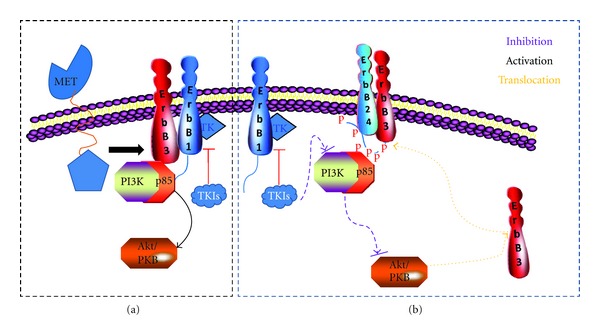Figure 2.

Mechanisms by which HER3 contributes to resistance to EGFR-targeted therapy. (a) The oncogenic receptor tyrosine kinase MET could phosphorylate HER3, leading to activation of the PI3 K/Akt pathway independent of EGFR kinase activity [57]. (b) Lengthy exposure of cancer cells to TKIs can lead to Akt downregulation which consequently increases HER3 translocation from the cytoplasm to the membrane through a feedback regulation. The phosphorylation of HER3 recruits PI3 K and further activates the PI3 K/Akt pathway which plays an important role in resistance to EGFR-targeted therapy [2].
